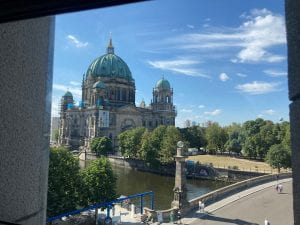As a student that primarily studies immigration, immigrants, and themes of belonging while at Northwestern, studying abroad in Berlin has offered me a unique opportunity to witness a new context in which immigration is significant. Approximately 30% of Berliners are immigrants. Thus, with my interests in mind, I had chosen to apply to study abroad in Berlin because of the huge immigrant population present in Berlin. This population made Berlin feel huge. When walking down a street in Berlin, I could hear upwards of 5 languages within a 5 minute time span which felt so special. It would be wrong to claim that all immigrants and foreigners in Berlin encounter welcoming treatment upon settling into the city, however, in most cases it felt as though immigrants were welcomed with open arms into Berlin as they gleefully shared their culture with the city through food, clothing, and language.I think whether it is coincidentally or not, I’ve been really appreciating gaining perspective from the immigrants, whether first, second or third generation, that live in Berlin and are able to contribute to the knowledge and perspective that tourists like us can utilize to deconstruct colonial narratives that are incorrectly being popularized. Given Germany’s recent history, I find it fascinating that people can now very willingly publicize or popularize their critiques of the nation, but more specifically of the city of Berlin. Though I have mentioned a lot of critiques we’ve heard about Germany and Berlin, upon our return from Potsdam I got the chance to speak with a Colombian family on the U7 that had very recently immigrated to Germany, abandoning what they described to me as their American Dream and thus “ending up” in Germany. They told me how they were spending a day being “tourists” in Berlin because they live in a neighboring city that isn’t nearly as welcoming, warm, or lively. We talked about quite a bit more but, overall, I thought it was important to have their perspective on Berlin as well. Though it is certainly haunted by a history of division, repression, and oppression, Berlin as a modern city is a welcoming home for those who may not feel at home otherwise. Thus, I’ve been proceeding in this program keeping both the critiques and positive notes in mind as they are both almost equally important and relevant to my experience in and understanding of Berlin.


